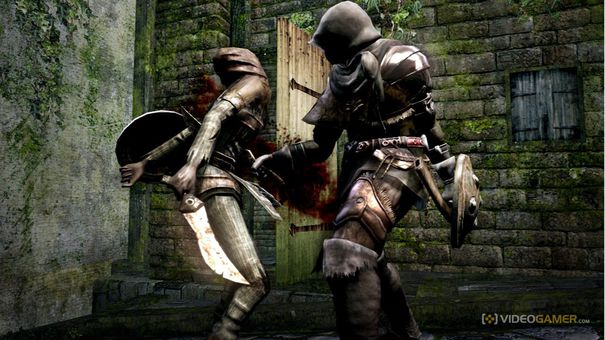

Once in a blue moon there is a game that breaks the ranks of the obscure and unknown into the spotlight of the gaming world. In the past few years we had the likes of Minecraft, Amnesia, and the now biggest game in the world League of Legends jumping from the indie ranks into a profitable and sustainable mainstream product. The Stanley Parable is not one of these games because, well, it isn’t really a game, or is it?

The Stanley Parable developed by Source Engine modder Davey Wreden is called a video game only due to the fact that there are no other industry buzz words to define what this thing is, I will coin the term interactive experience for this title as that is exactly what it is, or is it?
The gist of this experience is that you play a man named Stanley who lives his life working in a cubicle all day pressing buttons when directed to do so by a speaker in the room. But one day when at work Stanley didn’t get a direction to follow in over an hour and suspiciously all of his co-workers seemed to have disappeared. It is now your duty to go and find out what happened to all your co-workers, or is it?
I cannot say anything else about the plot with this experience as everything after that is a spoiler and as the experience can last as little as a few minutes for some so ruining it wouldn’t be any fun. What The Stanley Parable does is give you a choice to play the experience however you want to play it, kind of. While you are in full control of Stanley's movements and decisions, during the experience there is a British man narrating the story telling the player what they should do to fit in with the story that the designers wanted to tell. If you go off the path that was laid out by this narrator, he will begin to yell at you in a witty manner to get back on track for sake of the story.
The name of the game is choice, or at least sign of it. What The Stanley Parable accomplished is satire on player psychology at a metaphysical level. Does the player follow the narrator for the story or veer off on their own to tell their own story, or is that what the narrator and developers want you to do in the first place? The one spoiler I will say is that there are multiple and I mean multiple endings to this story, some endings are very linear in traditional game sense with others of the more obscure, but always finding a way to emit humor at times you would not expect. The game is legitimately funny, not in “we have a funny gag to show you” way but a more look at the absurdity this interactive experience and genre represents.
I must admit before I go any further that before this game I haven’t played a lot of games in this genre of video games. I haven’t played Heavy Rain, Beyond Two Souls, Dear Esther, or pretty much anything of that ilk. I don’t have an issue with these games but never had motivation to play these titles, except for this particular title. Those games want to take the control out of the players hands and into the directors to tell the story that the director of the game wanted to tell. But The Stanley Parable seems to use a tongue-in-cheek way of making fun of this interpretation of gaming without being crude and malice.

The experience playing The Stanley Parable asks a lot of pertinent questions of what we as gamers come to expect from a player perspective. Do we want games to push us in the directional path of the developers intent or for us to create our own stories within the game to fit how we see the world of being. From the two choices it would seem fairly obvious to create your own story. But somehow we forget how terrible of storytellers many of us actually are.
Let’s take Bioshock, the game is on rails to the core. Ken Levine and his team wanted to tell the story of Rapture from a particular perspective of a failing city of Ayn Rand ideologies and power run amok. Now lets say the developers created an open world environment and gave control of the story to the player to do with the city of Rapture however they please. One thing gamers tend to have, at least in a game, is a god complex. A players lust for power would turn Jack into the epitome of Andrew Ryan's ideals all along. This would convelunt the message that Levine and co. were trying to portray and guaranteed make the game less memorable.
But what I adore so much about Wreden’s experience is he didn’t hit you over the head with his thoughts on game design and storytelling, it was subtle, and I’m not even sure it was an actual opinion, it might just be my opinion under the façade of his opinion of one of many opinions the game may have and represent. Got it?
That’s the beauty of The Stanley Parable, what’s real? What’s fake? Is this the true ending he intended? Is there a true ending? The experience asks more questions than it answers and leaves the interpretation to the player themselves. Wait, is that what he was trying to portray to the audience about the industry and genre or did I make that interpretation up myself? I think I’m even more confused about this experience now than I did before writing this piece.
Anyways the experience is worth the price of admission(it's cheap) and highly recommend it to anyone in the “sophisticated” gaming audience (I’m sorry for using that word it makes me sound preachy and elitist but I don’t think the Xbox Call of Duty audience will enjoy it or understand the satire, tough) as it makes you question everything you know about decision-making and direction following in games in a fantastical, witty, and humerous manner. I think?




 Five reasons why The Man in the High Castle is a massive disappointment, so far
Five reasons why The Man in the High Castle is a massive disappointment, so far Mad Max Guide - Pink Eye's Stronghold Guide Project Locations & Rewards
Mad Max Guide - Pink Eye's Stronghold Guide Project Locations & Rewards The Most Comprehensive Steam Sale Guide
The Most Comprehensive Steam Sale Guide Theres no Tomo
Theres no Tomo Tales Of Zestiria Guide: Igraine Shrine Guide
Tales Of Zestiria Guide: Igraine Shrine Guide